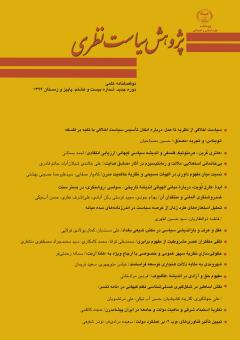شهروندی به مثابه دلالت هنجاری توسعه فراستمند
محورهای موضوعی : Research in Theoritical Politics
عباس منوچهری
1
![]() ,
سعید نریمان
2
*
,
سعید نریمان
2
*
1 - دانشگاه تربیت مدرس
2 - دبیرخانه شورای عالی انقلاب فرهنگی
کلید واژه: فرونسیس, توسعه فراستمند, شهروندی, مشارکت ودموکراسی مشورتی. ,
چکیده مقاله :
رابطۀ «توسعه» به معنای ایجاد شرایط برای «بهتر شدن زندگی»، با فلسفه سیاسی در سرآغازهای اندیشه مدرن به حاشیه رانده شد و در قرن بیستم، با اتکا به فایده گرایی و اقتصاد بازار، توسعه به مثابه «رشد» مدعی چیزی شد که دانش مدنی/ سیاسی از ابتدا در پی آن بود، یعنی «زندگی خوب». در دهههای اخیر، علوم انسانی- اجتماعی به فرونسیس (حکمت عملی) ارسطو توجه کرده است. این مقاله تلاش میکند تا از این مفهوم برای نظریهپردازی در حوزۀ توسعه بهره بگیرد. این مقاله، با اخذ مفهوم «فرونسیس» و ارتقای آن، سعی در ارائۀ یک نظریۀ توسعه با عنوان «توسعۀ فراستمند» دارد. نظریۀ توسعۀ فراستمند سعی در احیای پیوند اخلاق، اقتصاد و سیاست با توسعه دارد. به تعبیری با واسازی نظریۀ «رشد اقتصادی» و نشان دادن تقلیل گرایی آن در معنا و اهداف توسعه، برای بازسازی نظریه توسعه با بهره گیری از مقومات اندیشه مدنی/ سیاسی تلاش میشود تا نظریه فراستمندی توسعه با رویکرد دلالتی مطرح شود و نقش و جایگاه شهروندی به عنوان دلالت هنجاری توسعه فراستمند نشان داده شود. بدین معنا «شهروندی مبتنی بر ایده توسعه فراستمند»، مفهومی است که باید در پی تحقق آن باشیم و شاخص ارزیابی توسعه بر اساس میزان تحقق شهروندی در جامعه اندازه گیری شود. دموکراسی به مثابه خردورزی جمعی، مشارکت به معنای ارتقای فرونسیس شهروندان و آزادی، مهم ترین مؤلفههای تحقق شهروندی برای توسعه فراستمند هستند.
The relationship between political philosophy and development, as the creation of conditions that would lead to "life betterment", was marginalized in the beginnings of the development of modern political thought. Due to the influence of ideas such as utilitarianism and the market economy, the twentieth century witnessed the re-emergence of the concept of development as growth. The mentioned concept claimed what civic/political knowledge sought from the beginning, namely "Good living". This paper is an attempt to rebalance this situation by developing a theory of phronetic development based on the Aristotelian concept of phronesis. Using an implicative approach, the paper argues for using the concept of citizenship as the normative implication of phronetic development. In order to do so, the paper deconstructs economic growth theory, exposes its reductionist conception of development, and reestablishes the link between moral philosophy, economy, politics, and development. In this conception, democracy as public reasoning, participation as empowering citizens' phronesis, and freedom are the main constitutive elements of phronetic development. Therefore, appropriate policies and measures should be put in place to promote citizenship that induces phronetic development.
1. Arendt, h. (1998). The Human Condition. Chicago: University of Chicago Press.
2. Barnes, M. (1999). Users as citizens: collective action and the local governance of welfare . Social policy and administration , 73-90.
3. Cornwall, A. (2000). Making a Difference? Gender and Participatory development. IDS Discussion Paper.
4. Cowen M.P and R. W. Shenton: DOCTRINES OF DEVELOPMENT, London and New York, Routledge, 1996
5. Dallmayr , Fred R : Polis and Praxis: Exercises in Contemporary Political Theory ,Cambridge, The MIT Press, 1985.
6. Ellison, N. (1997). Towards a New Social Politics: Citizenship and Reflexivity in Late Modernity. Sociology, 697-717.
7. Gaventa, & Valderrama. (1999). ‘Participation, Citizenship and Local Governance –. Strengthening Participation in Local Governance. Brighton.
8. Gaventa, j. (2002). ‘Introduction: Exploring Citizenship, Participation and Accountability. IDS Bulletin.
9. Griffiths, J. (2015). Capability, Freedom, Life: The Politics and Metaphysics of Capability. University of St Andrews Graduate Conference in International Political, (pp. 1-13).
10. Habermas J, Theory and Practice, Tr. John Viertel. Boston, Beacon. Press, 1973.
11. HDR. (2000). Human Development Report. undp.
12. Irwin, t. (1985). Nicomachean Ethics. Indianapolis: Hackett.
13. Lister, R. (1998). Citizenship: Feminist Perspectives. NYU Press.
14. Mukhopadhyay , M., & Singh, N. (2007). Gender Justice, Citizenship and Development. Ottawa: International Development Research Centre.
15. Mukhopadhyay, & Meer. (2004). Creating Voice and Carving Space:Redefining governance from a gender perspective. Amsterdam: KIT Publishers.
16. Schuchman, p. (1980). Aristotle and the Problem of Moral Discernment. Berne: Peter Lang.
17. sen, a. (1992). Inequality Re-examined. Oxford: Clarendon Press.
18. sen, a. (1993). Capability and Well-Being. In M. C. Sen, The Quality of Life (pp. 30-53). Oxford: Oxford University Press.
19. sen, a. (1999). Development as Freedom. Oxford: Oxford University Press.
20. Sen, A. (2005). Human Rights and Capabilities. Journal of Human development, 151-166.
21. آرنت، هانا،1393: حیات ذهن، جلد دوم: اراده، ترجمه مسعود علیا. تهران، انتشارات ققنوس.
22. افروغ, عماد. (1391). مفهوم آزادی و مناقشات آن. نشریه معارف.
23. ایسینگ،اتمار،1374: تاریخ اندیشه ها و عقاید اقتصادی، ترجمه هادی صمدی، تهران، موسسه پژوهشهای سیاسی و اقتصادی بین الملل
24. بشیریه, حسین. (1375). ایدئولوژی و فرهنگ سیاسی گروههای حاکم در دوره پهلوی. فصلنامه نقد و نظر، شماره 7 , 74-85.
25. چاندوک، نیرا، 1377:جامعه مدنی و دولت کاوشهایی در نظریه سیاسی، تریجه فریدون فاطمی و وحید بزرگی ، تهران نشر مرکز
26. زدلاچک، توماش، 1396: اقتصاد خیر و شر، ترجمه احد علیقلیان، تهران، فرهنگ نشر نو
27. سن, آمارتیا. (1390). انديشه عدالت. تهران: كندوكاو.
28. سن, آمارتیا. (1392 ). توسعه یعنی آزادی. تهران: نشر نی.
29. سن, آمارتیا. (1999). دموكراسي به مثابه ارزش جهاني.
30. فالکس،کیث،1390: شهروندی، ترجمه محمد تقی دلفروز، تهران، نشر کویر
31. قدیری اصل، باقر،1387: سیر اندیشه های اقتصادی، تهران، دانشگاه تهران
32. کراکر, دیوید. (1385). آمارتیا سن و مردم سالاری شورایی. راهبرد یاس، شماره 4, 230-290.
33. منوچهری, عباس. (1395). فراسوی رنج و رویا. تهران : پژوهشکده تاریخ اسلام.

